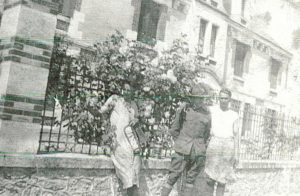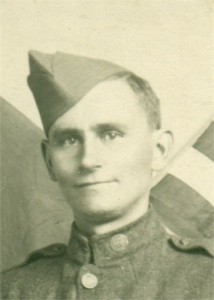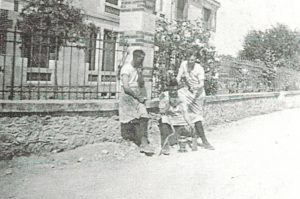 War is never pretty, and yet somehow, I had a picture in my head of the time my grandfather, George Byer spent in World War I that made it seem very benign. I never pictured him being in any danger. You see, my grandfather was a cook in the Army during the war, and somehow I pictured him working in a safe place where the war was a very distant reality, and not something to be faced or dealt with. The cooks in World War I didn’t even get a gun, so they must not be in danger…right? Wrong…very wrong!! The men on the front couldn’t drive home to the safety zone every night after work, like I had pictured in my head. The kitchen was very close to the front. In Grandpa’s case, that kitchen was a commandeered kitchen in the lowest floor of a French castle. As far as anyone knows, the residents of the castle still lived there, although I’m not sure how their meals were handled. Perhaps, their own cooks were allowed a little time in the kitchen, or maybe their meals were served along with the men in the Army. I don’t suppose we will know the full answer to that question in this lifetime.
War is never pretty, and yet somehow, I had a picture in my head of the time my grandfather, George Byer spent in World War I that made it seem very benign. I never pictured him being in any danger. You see, my grandfather was a cook in the Army during the war, and somehow I pictured him working in a safe place where the war was a very distant reality, and not something to be faced or dealt with. The cooks in World War I didn’t even get a gun, so they must not be in danger…right? Wrong…very wrong!! The men on the front couldn’t drive home to the safety zone every night after work, like I had pictured in my head. The kitchen was very close to the front. In Grandpa’s case, that kitchen was a commandeered kitchen in the lowest floor of a French castle. As far as anyone knows, the residents of the castle still lived there, although I’m not sure how their meals were handled. Perhaps, their own cooks were allowed a little time in the kitchen, or maybe their meals were served along with the men in the Army. I don’t suppose we will know the full answer to that question in this lifetime.
For a very long time…until just a few months ago, in fact, I carried the impression in my head that Grandpa’s job was really uneventful, other than the pressure of getting the meals to a large group of hungry men on time. Then, I came across a picture that I had seen several times over the past five years, but this time I was also  looking at the list my aunts had made about what the pictures were about. In that moment, my idea of my grandfather’s service was changed forever. On the list they had written, that the man on the right, or the man in uniform, was Grandpa. The second picture was tagged with, “Castle in France. Owner of castle died in Daddy’s kitchen” and “cooks, who worked under Daddy.” I was instantly intrigued. I spoke to my aunt, Sandy Pattan about it, and found out that indeed, the kitchen was commandeered for the Army’s use, and the owner had been wounded and ran into the kitchen for help. Grandpa tried to save him, but the wounds were too bad, and the owner died right there. The man’s injuries told me that the front was not far from the castle. I suppose you might think I was reaching a little on that thought, but you would be wrong, because as I talked with Aunt Sandy, she told me something else that really clarified the danger my grandfather lived with every day of his time in the service.
looking at the list my aunts had made about what the pictures were about. In that moment, my idea of my grandfather’s service was changed forever. On the list they had written, that the man on the right, or the man in uniform, was Grandpa. The second picture was tagged with, “Castle in France. Owner of castle died in Daddy’s kitchen” and “cooks, who worked under Daddy.” I was instantly intrigued. I spoke to my aunt, Sandy Pattan about it, and found out that indeed, the kitchen was commandeered for the Army’s use, and the owner had been wounded and ran into the kitchen for help. Grandpa tried to save him, but the wounds were too bad, and the owner died right there. The man’s injuries told me that the front was not far from the castle. I suppose you might think I was reaching a little on that thought, but you would be wrong, because as I talked with Aunt Sandy, she told me something else that really clarified the danger my grandfather lived with every day of his time in the service.
It was another day in the castle kitchen, the men were working on the next meal. Suddenly an American soldier ran in and told the cooks to run for the woods. It seemed strange to me that running would be the order they would receive, but remember that Aunt Sandy told me that the cooks had no guns. If they stayed in the castle, they would be sitting ducks, because cooks or not, they were in the American Army, and that made them enemies of the Germans. The reason the men were told to run for the woods…the Germans were coming  and they couldn’t stop them. The soldier didn’t have to tell the cooks twice. They dropped everything and ran. One of the cooks, while running into the woods, stepped on a dead man. The man had been dead a few days, because the cook’s foot went right into the man’s chest. Aunt Sandy told me that the smell was so bad and so permanent that when they couldn’t get the smell out of the man’s clothes, they had to be burned. I had no idea of the things Grandpa saw, nor of the danger he faced. It gave me a whole new picture of Grandpa Byer’s time in World War I. And I came to clearly realize that no job in the service is less dangerous than another…and least not on the front. It’s no wonder that most men don’t want to talk about the war.
and they couldn’t stop them. The soldier didn’t have to tell the cooks twice. They dropped everything and ran. One of the cooks, while running into the woods, stepped on a dead man. The man had been dead a few days, because the cook’s foot went right into the man’s chest. Aunt Sandy told me that the smell was so bad and so permanent that when they couldn’t get the smell out of the man’s clothes, they had to be burned. I had no idea of the things Grandpa saw, nor of the danger he faced. It gave me a whole new picture of Grandpa Byer’s time in World War I. And I came to clearly realize that no job in the service is less dangerous than another…and least not on the front. It’s no wonder that most men don’t want to talk about the war.


5 Responses to Grandpa’s Castle